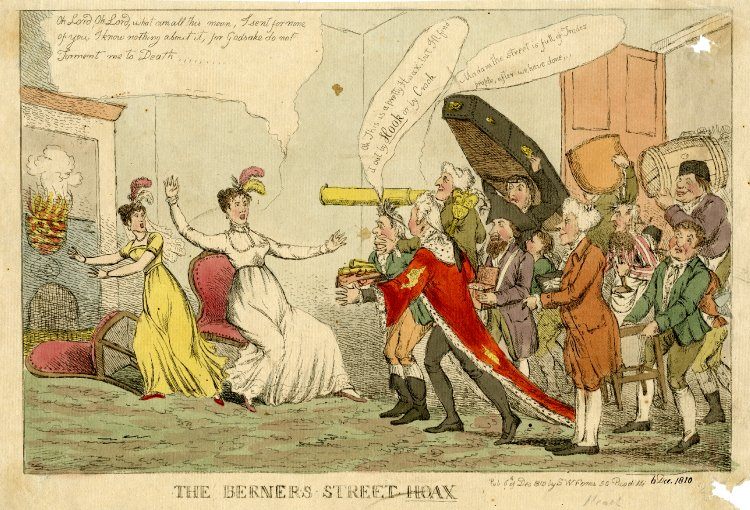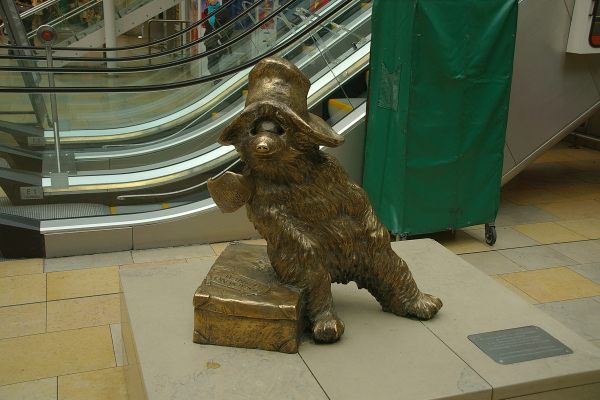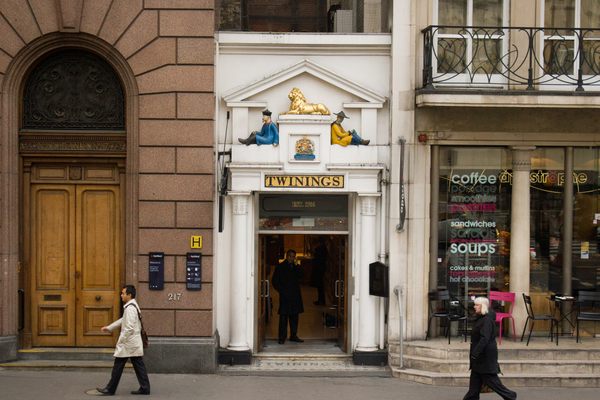Knock Knock. Who’s There? 2,500 Raspberry Tarts
The “Berners Street Hoax” took a common prank to extremes.

Every day leading up to April 1, we’re telling the story of one ridiculous historic prank. Find more here.
Imagine this: All the spam emails you’ve ever received have come to life, and one by one, they are ringing your doorbell. There, on your stoop, is a parade of products you never asked for. Dozens of providers of services you do not need are tapping on your windows. And look, coming up the driveway—is that a Nigerian prince?
Several centuries before the internet, the dramatist Theodore Hook essentially invented the spam campaign. On November 27, 1810, Hook dispatched hundreds of tradespeople, several tons of goods, and at least one royal personage all to the same sleepy apartment: No. 54 Berners Street in London.
It’s unclear exactly what motivated Hook. Some say a friend dared him to make 54 Berners Street the most famous address in the city. Others say the apartment’s resident, a Mrs. Tottenham, had upset him somehow. It’s also possible he just did it for laughs. As a friend of his once observed, “The exuberance of his fun was irrepressible… he did all sorts of strange things, merely that he might be doing [them].” A frequent hobby of his involved going to parties he hadn’t been invited to—although the hosts always figured him out eventually, he generally entertained everyone so much that they didn’t even mind.

For this trick, though, he decided to ramp things up a notch. According to The Life and Remains of Theodore Hook—a book cobbled together from Hook’s own writings by the biographer Richard Bentley—he and two friends spent six weeks writing invitations, asking “recipients to call on a certain day… at No. 54, Berners-street.” By the time the day arrived, the biography attests, they had sent “about four thousand letters,” all with airtight references, specific instructions, and—when necessary—a dash of intrigue. (It’s hard to resist an invitation from someone who writes that they are “desirous of speaking… on business of importance.”)
When the big day arrived, Hook and his friends posted up at a hotel on Berners Street, just across from No. 54. Newspapers give us an idea of what they saw. First, reports say, came a single chimney sweep, who showed up promptly at 5 a.m. About a dozen more soon followed. Throughout the morning and afternoon, the address was swarmed by all manner of callers, visits from whom, under normal circumstances, would have been mutually exclusive: undertakers and accoucheurs; opticians and dentists; coal wagons and wedding cakes; and carts bearing “linens, jewellry, and every other description of furniture, sufficient to have stocked the whole street.”

Six burly men delivered an organ. Forty butchers came wielding 40 legs of mutton. Then the Mayor of London himself careened around the corner in his carriage. He had received a personal letter from Mrs. Tottenham, he explained, telling him that she was too ill to make their scheduled meeting, and asking if he could stop by her place instead.
Hook’s biography attests to still more visitors—attorneys, clergymen, even the Duke of Gloucester. In any case, between the confused tradespeople and the curious spectators, the streets were soon clogged to impassability. Even the policemen could do nothing. It was, Jackson’s Oxford Journal concluded, “the greatest hoax that ever has been heard of in this Metropolis,” and if its perpetrator was ever found, they should be punished “for such despicable waggery.”
Although Hook was never officially caught, much of London suspected him. Even before his posthumous autobiography, Hook sort of owned up to the joke: In his play, Gilbert Gurney, he gives the main character the fun of confessing. “What else made the effect in Berners Street? I am the man,” he says. “[I sent] piano-fortes by dozens, and coal waggons by scores… two thousand five hundred raspberry tarts from half a hundred pastry cooks… even Royalty itself.” Mrs. Tottenham surely never crossed him again.
























Follow us on Twitter to get the latest on the world's hidden wonders.
Like us on Facebook to get the latest on the world's hidden wonders.
Follow us on Twitter Like us on Facebook